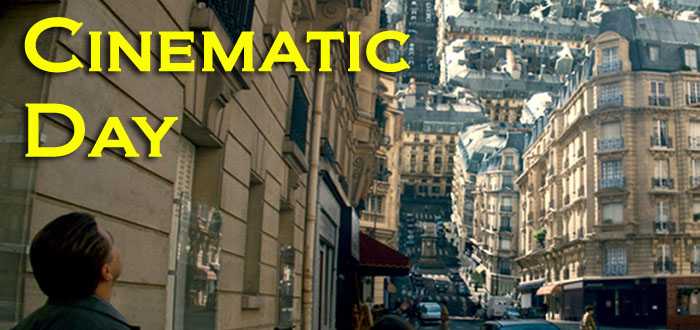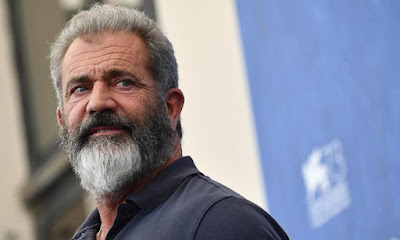Earlier this year, Ken Loach won the top prize at Cannes with his latest film I, Daniel Blake. Several news sites relayed the same image in their articles. It featured Loach with his award, flanked by George Miller...and Mel Gibson.
The one time A-Lister and celebrated director, whose public fall from grace all but ended his career, had now emerged at the most prestigious film festival on the calendar. It was just as surprising to read about the standing ovations he received at screenings of Blood Father, his latest action movie.
In the era of instant, disposable celebrities, many have forgotten that Mel Gibson was once the biggest movie star in the world. The twists and turns of his career reveal a talented, if restless man, one determined to challenge himself at all costs.
The Actor
The Actor
Gibson is a graduate of Australia's NIDA, the prestigious acting school that also spawned Cate Blanchett and Geoffrey Rush. Seemingly overnight, he was cast as the titular Mad Max in George Miller's ambitious debut action film. He reprised the role in two sequels, and along the way gained momentum with roles in Gallipoli and Mrs Soffel. There was also The Bounty, which saw him square up against the legendary Anthony Hopkins.
It was around this time that Richard Donner's Lethal Weapon catapulted him into stardom. As the unhinged and mulleted Martin Riggs, Gibson carved out a masculine screen persona that appealed to everyone. Beneath the tough action man was a fragile soul. The film showcased his ability to portray slapstick comedy, explosive rage and childlike innocence. An unlikely friendship with a weary cop, played by Danny Glover, propelled what became the quintessential buddy movie. It led to three more sequels, each more outlandish and successful at the box office.
Other notable films of the Lethal Weapon era include Ransom, Maverick and Pocahontas (as the voice of John Smith). Hamlet is in my opinion the best example of the fearlessness and compulsive risk taking that has defined Gibson as an actor. He was riveting, unpredictable and raw. No one had ever seen the doomed prince of Denmark portrayed this way.
He has often talked about the role of perception in his choices. Action star, romantic lead, Shakespearean actor; many wondered what would come next. His emergence as an important and controversial director surprised the film world and audiences alike. It also rejuvenated him just as his stardom was beginning to show signs of fatigue.
He has often talked about the role of perception in his choices. Action star, romantic lead, Shakespearean actor; many wondered what would come next. His emergence as an important and controversial director surprised the film world and audiences alike. It also rejuvenated him just as his stardom was beginning to show signs of fatigue.
The Director
Gibson made his directional debut with Man Without a Face, playing a disfigured teacher with a murky past. He displayed a natural talent for visual storytelling and drama. His next effort was the now legendary Braveheart. He answered critics who doubted his ability to wield William Wallace's enormous sword. But the true revelation was his ambitiousness as a film maker. The battle sequences were some of the most complex attempted at the time. Hordes of real warriors and their horses fought it out with minimal cgi to assist them.
Defying blockbuster expectations, Gibson led audiences into a remarkably downbeat ending. Braveheart went on to become the rare box office success that also achieved pop culture immortality. The 'freedom' speech is still quoted today. The epic story won best film at the Oscars; admittedly, 1996 was a weak year in terms of competition, but it's an impressive feat nonetheless.
Gibson made his directional debut with Man Without a Face, playing a disfigured teacher with a murky past. He displayed a natural talent for visual storytelling and drama. His next effort was the now legendary Braveheart. He answered critics who doubted his ability to wield William Wallace's enormous sword. But the true revelation was his ambitiousness as a film maker. The battle sequences were some of the most complex attempted at the time. Hordes of real warriors and their horses fought it out with minimal cgi to assist them.
Defying blockbuster expectations, Gibson led audiences into a remarkably downbeat ending. Braveheart went on to become the rare box office success that also achieved pop culture immortality. The 'freedom' speech is still quoted today. The epic story won best film at the Oscars; admittedly, 1996 was a weak year in terms of competition, but it's an impressive feat nonetheless.
In the midst of being celebrated as a director, he continued to tally up lead roles, with diverse work in such films as What Women Want, Signs and We Were Soldiers Once.
The film that rocketed Gibson to auteur status and reinvented the biblical epic was just around the corner. The Passion of the Christ confounded expectations. It was brutal, uncompromising and horrifying. Graphic torture scenes showed Jesus being mercilessly flogged. At one point his back was reduced to quivering flesh. And the most realistic crucifixion sequence ever filmed was yet to come. The spectacle shocked Christians and non believers alike. It was relentless. This is what it would feel like to be tortured, nailed to a cross and strung up to die. The ending, where Jesus rises from the dead, was almost an afterthought. Audiences were too stunned to feel anything but relief by this point.
For me it remains an unforgettable film experience. The theatre had a carnival atmosphere, with families, religious zealots, old people, film geeks and curious movie goers not knowing what they were in for. Without ads, the curtains opened and the film began with Jesus alone in Gethsemane, praying for guidance (in Aramaic, with subtitles).
The film that rocketed Gibson to auteur status and reinvented the biblical epic was just around the corner. The Passion of the Christ confounded expectations. It was brutal, uncompromising and horrifying. Graphic torture scenes showed Jesus being mercilessly flogged. At one point his back was reduced to quivering flesh. And the most realistic crucifixion sequence ever filmed was yet to come. The spectacle shocked Christians and non believers alike. It was relentless. This is what it would feel like to be tortured, nailed to a cross and strung up to die. The ending, where Jesus rises from the dead, was almost an afterthought. Audiences were too stunned to feel anything but relief by this point.
For me it remains an unforgettable film experience. The theatre had a carnival atmosphere, with families, religious zealots, old people, film geeks and curious movie goers not knowing what they were in for. Without ads, the curtains opened and the film began with Jesus alone in Gethsemane, praying for guidance (in Aramaic, with subtitles).
The film divided critics, generated debate about the meaning of forgiveness and compassion, and went on to become a massive blockbuster. It was most successful R rated film in history until Deadpool came along. Financed and released by Gibson's Icon Productions, it was a tremendous gamble. But it paid off and stamped him as a maverick who would risk it all to fulfil his vision.
His next film Apocalypto, was no less violent. It told the story of a young tribesman's descent into hell after being captured by Mayans. It challenged audiences with shocking scenes of ritualised human sacrifice. Gibson lovingly recreated the gruesome details, but also told the parable of an empire on the verge of collapse. Such a critique of George W. Bush's America was controversial at the time. The film was moderately successful at the box office, but failed to win awards.
The Fall
Gibson's fall from grace was punctuated by ugly incidents involving alcohol. He was arrested for drunk driving, and in the process launched into an anti Semitic rant. It went public. He was effectively blacklisted and the lucrative roles dried up. His next directorial project, a Viking epic that would've teamed him with Leonardo Di Caprio, was shelved. And he was soon in trouble again. His wife at the time, Oksana Grigorieva, recorded a series of misogynist and racist phone calls that exposed him as a bully.
Both events revealed Gibson was deeply miserable; an alcoholic monster consumed by hate. The drama played out just as social media, TMZ and outrage culture were becoming relevant. Gibson was the epicentre that united all three. He was pilloried, ridiculed and cast out. His carefully constructed public image was blown to pieces. Unfortunately for Jodie Foster, the backlash was in full swing by the time The Beaver was released. With Gibson in the lead role, her insightful drama about midlife depression sank without a trace.
Both events revealed Gibson was deeply miserable; an alcoholic monster consumed by hate. The drama played out just as social media, TMZ and outrage culture were becoming relevant. Gibson was the epicentre that united all three. He was pilloried, ridiculed and cast out. His carefully constructed public image was blown to pieces. Unfortunately for Jodie Foster, the backlash was in full swing by the time The Beaver was released. With Gibson in the lead role, her insightful drama about midlife depression sank without a trace.
An involvement in the long planned Mad Max sequel was all but dead. In what was the cruellest blow, George Miller eventually released Fury Road with Tom Hardy in the lead role.
The Return
Gibson slowly worked his way out of the wilderness. Robert Rodriguez took a chance and cast him in Machete 2 as a villain. So did Sylvester Stallone in Expendables 3. These roles helped him ease back into the public consciousness, yet kept him away from scrutiny. Along the way he made the surprisingly watchable Get the Gringo (aka How I Spent My Summer Vacation). Gibson poured all his tough guy charm into the role of an imprisoned criminal out for a final score.
His true return to form however, was this year's Blood Father. It may have been a run of the mill story about a man protecting his daughter from thugs, but it was entertaining and heartfelt. Gibson dominated every scene. The restless energy was still there, but now his screen persona was grizzled and damaged. He'd absorbed a turbulent life, and the result was a painfully honest performance. It made me realise he's one of the few movie stars who never settles for a paycheck.
Gibson would do well if he chose to follow Liam Neeson and forge himself as a senior action hero. But as always, he's not content to take the easy route. He's diving back into directing with the World War 2 drama Hacksaw Ridge. Shot in Australia for a modest sum and starring Andrew Garfield, it's gathering buzz and should scoop nominations in the upcoming awards season. There's also a palpable sense that audiences are ready to welcome him back. A nostalgic renaissance beckons.
To get there, he'll have to survive the barrage of interviews about his personal life, and waves of ridicule by online trolls. If he wins a Golden Globe or an Oscar, how will the Hollywood crowd respond? They may dish out boos, standing ovations or both. But I think Mel Gibson deserves a second chance. Regardless of his deplorable behaviour in the past, he's a movie star with soul, a thrilling film maker, and one of the last cinematic icons we have left.


No comments:
Post a Comment